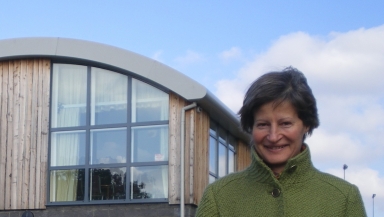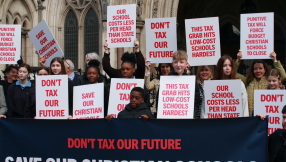
A Christian councillor has successfully challenged code of conduct proceedings against her after she refused to back the use of public funds for a gay pride event.
Mary Douglas, a Conservative councillor in Salisbury for 15 years, was removed from her portfolio role for skills and mobility in November 2019 over her stance.
Wiltshire Council claimed that the £2,000 grant was needed to "raise the LGBTQ profile seeking better understanding and acceptance of the LGBTQ community and ensuring that Salisbury is a safe and fully inclusive city for all."
At the board meeting last year, Cllr Douglas said she was unable to support the proposal because she could not support LGBTQ "ideology".
She said there was a "silent majority" of people who share the same view but "are afraid to say so".
"In fact, even if I agree with the ideology, should local government be funding a march to raise the profile and promote the worldview of any one part of our community?" she continued.
"In a diverse society, we need to tolerate different viewpoints and lifestyle, but we do not need to affirm them. Indeed, the very word 'tolerate' indicates that we disagree or potentially disapprove of that which we are asked to tolerate.
"We absolutely should permit marches promoting an ideology, religion or worldview but we do not need to and, indeed, should not promote them."
The council claimed that her refusal to support the grant contravened the public sector equality duty.
Last week, she was exonerated after a hearing in which the council conceded that Cllr Douglas was within her rights under Article 10 of the European Convention on Human Rights.
The council also concluded that Cllr Douglas did have due regard for the public sector equality duty.
Explaining its reversal, Wiltshire Council said: "We have considered Cllr Douglas' right to freedom of expression under Article 10(2) of the European Convention on Human Rights, and the relevant case law which identifies an enhanced level of protection for councillors engaging in political debate. We have further concluded that it would not be justified in this instance to interfere with her right to freedom of expression.
"Therefore, whilst the Sub-Committee considers that Cllr Douglas' actions were not wise or helpful there was no breach of the Code."
Cllr Douglas was supported by the Christian Legal Centre (CLC), which in written submissions said that she was opposed to the political message of the gay pride event, not the people involved.
The submission concluded: "Both sets of beliefs, those which support the LGBT campaigning worldview here represented by the grant proposal in question, and those which rest on dissenting philosophical, moral and religious convictions, enjoy equal protection under the law."
Responding to the outcome, Cllr Douglas said it was vital that public officials be free to express their beliefs.
"The consequences of not coming to this conclusion would have been untenable and deeply concerning for freedom of speech and expression for elected officials," she said.
"If the council had found against me, it would have set a precedent that I and other public officials are not allowed to disagree with groups of people, events or political messages with which we disagree.
"Such a verdict would effectively end conversation, debate and the ability to express a belief and opinion.
"I said what I did, not because I don't love people who identify as LGBT, but because I do. I made the statement because I didn't just want to reject the grant application, I wanted people to understand why.
"I do not agree with the political message of gay pride, and should have the right to say so. To disagree is not to disrespect. In fact, to take the trouble to express disagreement with someone is a mark of respect.
"Across UK society, we must be able to disagree with each other while also holding each other in the highest esteem. To be able to say what we think and believe is vital for democracy, community cohesion and good decision making."
CLC chief executive Andrea Williams said the council's actions against Cllr Douglas were "chilling".
"While we are happy that Cllr Douglas has been vindicated, it never should have come to this," she said.
"There is a chilling effect on political debate when an elected official acting in good faith and on behalf of her constituency can be subjected to code of conduct hearings because of nebulous and ill-defined equality considerations.
"It is my hope that the Wiltshire Council will put democracy first in the future, and try better to understand that Cllr Douglas and her constituents alike can hold dissenting views to using public funds to support a Pride event without acting with discriminatory intent.
"When Cllr Douglas was elected people knew exactly who they were voting for. She made no secret of her Christian faith. She is a very popular member of the local community, who has served it well for many years.
"We call on public bodies across the UK to understand and respect officials and elected members' right to freedom of speech and expression, so that nobody else has to go through what Cllr Douglas has."













